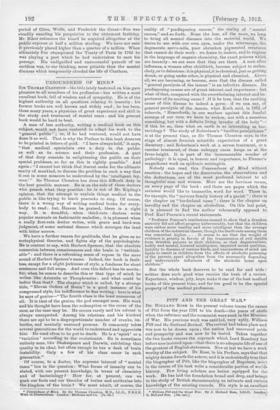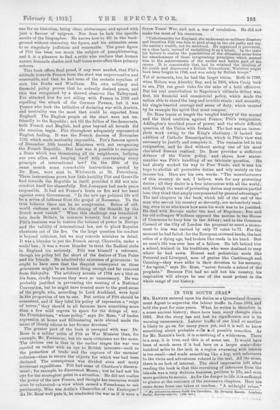PITT AND THE GREAT WAR.* Dn. HOLLAND Ross] in the
present volume traces the career of Pitt from the year 1791 to his death—the years of strife when the reformer and the economist were sunk in the Minister of War. His previous work was entitled, very aptly, William Pitt and the National Revival. The revival had taken place and was now to be drawn upon ; the nation had recovered pride and prosperity and was now to be tested. Taken together the two books remove the reproach which Lord Rosebery has before now insisted upon—that there is no adequate life of one of the greatest of English statesmen. Now at last we have a work worthy of the subject. Dr. Rose, in his Preface, says that that mighty drama dwarfs the actors; and it is undoubtedly true that the biographer of Pitt, like the biographer of Napoleon, must in the course of his task write a considerable portion of worlds history. Few living scholars are better equipped for the work. He has laid the foundation broad and deep, and brings to the study of British statesmanship an intimate and curious knowledge of the existing records. His style is an excellent
• William Pitt and the Great War. By I. Holland Rose, Litt.D. London': G. Bell and Son. [16s. net.]
one for an historian, being clear, picturesque, and spiced with just a flavour of epigram. Nor does he lack the specific merits of the biographer. He knows how to fill in the back- ground without obscuring the figure, and his estimates seem to us singularly judicious and reasonable. The great figure of Pitt has been too much the subject of pamphleteering, and it is a pleasure to find a critic who realizes that human nature demands shades and half-tones more often than primary colours.
This book offers final proof, if any were needed, that Pitt's attitude towards France from the start was unprovocative and reasonable, and that he had none of the ecstatic royalism of men like Burke and Windham. His own military and financial policy proves that he ardently desired peace, and this was recognized by a shrewd observer like Talleyrand. Fox attacked him for not siding with France in 1792 and repelling the attack of the German Powers, but it was France who took the initiative of declaring war with Austria, and neutrality was the most that could be expected from England. The English people at the start were not un- friendly to the Republic ; not till the follies of the democrats, both French and English, had gone beyond all bounds did the reaction begin. Pitt throughout adequately represented English feeling. It was the French decrees of November 1792 which made neutrality impossible. Fox's famous speech of December 13th taunted Ministers with not recognizing the French Republic. But how was it possible to recognize a State which was threatening all its neighbours, bullying cur own allies, and busying itself with overturning every principle of international law P On the 29th of the same month some remarkable instructions, quoted by Dr. Rose, were sent to Whitworth at St. Petersburg. These instructions prove bow little hostility Pitt and Grenville bad towards the Republic in itself, provided it did not mis- conduct itself too shamefully. But Jemappes had made peace impossible. It had set France's brain on fire and her hand against every Government. " In the new age political life will be a series of tableaux from the gospel of Rousseau. To the true believer there can be no compromise. Relics of old- ivorld customs such as the closing of the Scheldt by the Dutch must vanish." When this challenge was translated into deeds Britain, in common honesty, had to accept it. Pitt's business was to restore the balance of power in Europe and the validity of international law, not to pluck Royalist chestnuts out of the fire. On the large question his conduct is beyond criticism, but we may concede mistakes in detail. It was a blunder to put the French envoy, Chauvelin, under a social ban ; it was a worse blunder to treat the Radical clubs in England too seriously. Pitt was himself a reformer, though his policy fell far short of the desires of Tom Paine and his friends. He admitted the existence of grievances : lie .ought to have seen that the disquiet consequent on these grievances might be an honest thing enough and far removed from disloyalty. The arbitrary arrests of 1794 are a blot on his fame, chiefly because they were so unnecessary. He was probably justified in preventing the meeting of a National Convention, but he might have trusted more to the good sense of the people, who, according to Lord Auckland, were loyal in the proportion of ten to one. But critics of Pitt should be consistent, and if they label his policy of repression a " reign of terror," they should in all fairness have something more than a few mild regrets to spare for the doings of, say, the Fructidorians, "whose policy," says Dr. Rose, " of leaden repression at home and filibustering raids abroad made the rtame of liberty odious to her former devotees."
The greater part of the book is occupied with war. Dr.
Rose is a milder critic of Pitt as War Minister than, for example, Mr. Fortescue; but his main criticisms are the same.
The obvious one is that in the earlier stages the war was carried on rather with an eye to British interests—such as blie protection of trade and the capture of the enemies' -colonies—than to secure the objects for which war had been ,declared. The consequence was divided aims and many irrelevant expeditions. Pitt had seine of Chatham's discern- ment; for example, he discovered Moore; but he had not his ,eye for the strategical point in a situation. Ho did not realize the power of the new France, and thought her resources would
noon be exhausted—a view which caused a Frenchman to ask !pertinently, Who was Attila's Chancellor of the Exchequer? '.As Dr. Rose well puts it, he conducted the war as if it were a Seven Years' War, and not a war of revolution. He did not- make the most of his resources.
"Unfortunately for England, she underwent no military disaster; - and therefore Pitt was fain to pled along in the old paths and use the nation's wealth, not its manhood. Ho organized it piecemeal,. on a class basis, instead of embattling it as a whole. In tho main his failure to realize the possibilities of the situation arose from his abandonment of those invigorating principles which nerved him to the achievements of the earlier and better part of his career. It is conceivable that, had he retained the idealism of his youth and discovered a British Scharnhorst, Waterloo might have been fought in 1706, and won solely by British troops."
Yet at moments, too, he bad the larger vision. Both in 1798, when Nelson won Aboukir Bay, and in 1805, when Craig took to sea, Pitt ran great risks for the sake of a bold offensive. But his real contribution to Napoleon's ultimate defeat was, first, his financial and commercial policy, which made the nation able to stand the long and terrible strain ; and, secondly,
his single-hearted courage and sense of duty, which created by its example the spirit that must conquer.
Dr. Rose traces at length the tangled history of the second and the third coalition against France, Pitt's resignation, Addington's troubled years of power, and the whole difficult question of the Union with Ireland. The last was an incom- plete work owing to the King's obstinacy : it lacked the addition of Catholic Emancipation, which in Pitt's view was necessary to justify and complete it. The omission led to his resignation, and he died without seeing one of his most cherished dreams realized. Dr. Rose provides a sufficient defence of the Union policy, and shows how states- manlike was Pitt's handling of an intricate question. He had slowly worked his way to Free Trade, and it was his hope to abolish all protective duties and rely mainly on the income tax. Here are his own words : "The manufacturers of this country do not, I believe, wish for any protecting duties ; all they desire is a free intercourse with all the world; and, though the want of protecting duties may occasion partial loss, they think that amply compensated by general advantage." The last chapters in the book, which tell of the end of the
man who served his country so devoutly, are melancholy read- ing, even to us who know how soon his work was to be justified. He died with Europe under the heel of Napoleon ; Fox and his old colleague Windham opposed the motion in the House of Commons to bury him in the Abbey; and in the Common Council of the City of London the proposal to erect a monu-
ment to him was carried by only 77 votes to 71. For the moment he had failed : for the European crowned heads, the last relics of a dying age, had broken like reeds in his hand. But no man's life was ever less of a failure. He left behind hint a school, trained in his traditions, who were destined to reap where he had sown. Honest and pedestrian souls like Perceval and Liverpool, men of genius like Castlereagh and Canning—they were alike in their devotion to his memory. "An egoist.," says Dr. Rose, "never founds a school of the prophets." Because Pitt had no self but his country, his inspiration will always be one of the most potent in the whole range of our history.











































 Previous page
Previous page